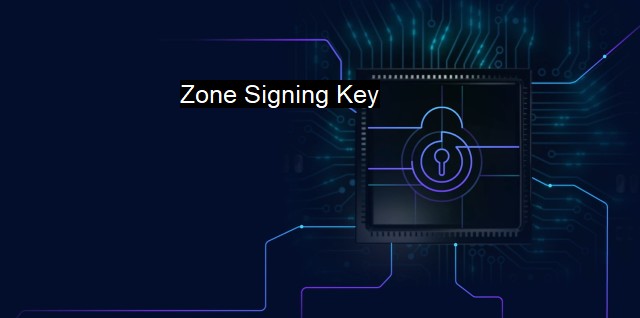What is Zone Signing Key?
Securing the Internet: The Role of Zone Signing Keys in DNSSEC for Businesses Worldwide
Zone Signing Key (ZSK) is a crucial feature in the cybersecurity space, particularly linked to the functioning and management of Domain Name System Security Extensions (DNSSEC). To comprehend what Zone Signing Key is, it's essential to first understand a few critical aspects of the DNSSEC system.DNSSEC, a set of protocols added to provide security, is an enhancement of the predominant Domain Name System (DNS). The DNS functions much like a phone book of the internet, translating the server names that we type into the net browsers into Internet Protocol (IP) addresses that computers use to locate each other over the web.
The major aim of DNSSEC is to offer authentication and integrity to the DNS, preventing falsified information from being incorporated into the DNS system by hackers or other malicious elements. this procedure of verification is done through a mechanism of digital signing and cryptographical keys, among which one of the most significant keys is the Zone Signing Key.
The Zone Signing Key has a specific task in the DNS and DNSSEC structure. It digitally signs each DNS report; to explain, it creates a unique code linked to each DNS document. The receiver can then verify that the DNS record has not been altered while in transit, thereby ensuring the authentication and integrity of the message. ZSK is to maintain the information secure on a familiar level, managing and trademarking the information within the zone of signing capacity.
Another crucial point to comprehend is that the Zone Signing Key is frequently changed, usually once every quarter or a month, depending on an organization's security preference. This regular change is instrumental in preventing cases where the ZSK might have been compromised, providing a robust layer of information security.
There's another category of keys utilized in managing DNSSEC, known as the Key Signing Key (KSK). The KSK solely signs the zone's DNSKEY record, overseeing the whole zone. it adds an extra level of protection since the KSK has to approve (digitally sign) any modifications of ZSK. Because modifications in KSK could disrupt the DNS operation, KSKs are switched less frequently than ZSKs.
Since the Zone Signing Key performs such a critical role in ensuring the integrity and authenticity of data, ZSK management must be executed carefully and securely. Necessary precautions must be taken while transferring or copying these keys as they contain sensitive information about DNS records.
The importance of ZSK in the realm of cybersecurity continues to increase with the reliance on seamless and secure digital communications. It is instrumental in preventing data tampering, safeguarding user privacy, and maintaining trust in the digital communications domain with effective antivirus tools and cybersecurity measures.
In the age where data integrity and security become the pillar of information technology, Zone Signing Key plays the role of the silent gatekeeper. ZSK literally signs-off each information dialogue happening within its zone, symbolizing conformity and maintaining the sanctity of each byte of information.
Cybersecurity, intertwined with concepts like DNSSEC, Zone Signing Key, and Key Signing Key, underpins today's internet. Considering ever-increasing online threats, it is mandatory to encrypt communication between DNS servers with ZSK to verify the authenticity of zones or records, contributing significantly to a more safe and secure digital universe.

Zone Signing Key FAQs
What is a zone signing key in cybersecurity?
A Zone Signing Key (ZSK) is a cryptographic key used to sign the resource records of a DNS zone. It is used to secure a DNSSEC-secured domain and is an important component of the DNSSEC infrastructure.What is the purpose of a zone signing key in cybersecurity?
The purpose of a zone signing key is to ensure the authenticity and integrity of DNS data. It helps prevent cyber attacks such as DNS spoofing, cache poisoning, and man-in-the-middle attacks. By signing DNS records, a ZSK ensures that only authorized DNS servers can modify the DNS data for a particular domain.How do I generate a zone signing key?
You can generate a Zone Signing Key using various DNS management tools. The process often involves creating a public and private key pair, then installing the public key on the DNS server and using the private key to sign the DNS records. You should follow the specific instructions provided by your DNS management tool to create a ZSK.How often should I rotate my zone signing key?
It is recommended to rotate your zone signing key on a regular basis to prevent potential security breaches. Depending on the level of security required, rotation can be performed annually, bi-annually, or quarterly. You should also rotate your key after any major DNS changes or after key compromise.| | A | | | B | | | C | | | D | | | E | | | F | | | G | | | H | | | I | | | J | | | K | | | L | | | M | |
| | N | | | O | | | P | | | Q | | | R | | | S | | | T | | | U | | | V | | | W | | | X | | | Y | | | Z | |
| | 1 | | | 2 | | | 3 | | | 4 | | | 7 | | | 8 | | |||||||